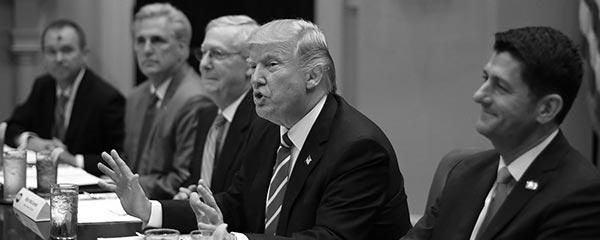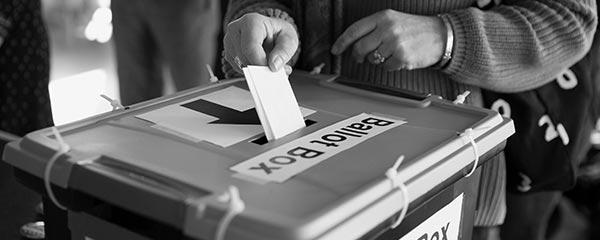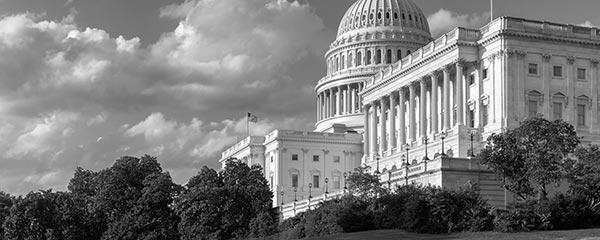Story Highlights
- Approval has increased to 44% from 38% in mid-September
- Just completed 7th quarter average slightly lower than 6th quarter
- Clinton, Reagan had similar 7th-quarter averages
WASHINGTON, D.C. -- President Donald Trump's job approval rating has improved to 44% each of the past two weeks. Trump's weekly approval rating was 38% in mid-September and had been averaging 40% from late July through late September.

The latest results are based on an Oct. 15-21 polling of a random sample of 1,507 U.S. adults.
While still low in an absolute sense, Trump's current 44% job approval rating is just one point below his personal best recorded his first week in office and this past June after his summit with North Korean leader Kim Jong Un.
Trump's job approval rating may be benefitting from the strong employment numbers released early this month but also the more intense political environment in recent weeks as the news has focused on the Senate's confirmation of Brett Kavanaugh to the Supreme Court and the midterm elections.
In recent weeks, there has been a narrowing of the gap in U.S. party affiliation. The past two weeks, the Democratic Party has held just a two-point advantage, with 43% of Americans identifying as Democrats or identifying as independents but saying they lean to the Democratic Party, while 41% are Republicans or Republican-leaning independents. From late July through Oct. 7, Democrats maintained a five-point advantage, 45% to 40%.
At the same time, Americans who identify or lean Republican have given Trump higher job approval ratings, increasing from 81% to 85%. This includes a 90% job approval rating, up from 86%, among Americans who initially identify as Republicans. The 3-point increase in Trump's job approval among independents mostly reflects more positive ratings from independents who lean Republican.
| July 23-October 7 | October 8-14 | Change | ||||||||||||||||||||||||||||||||||||||||||||||||||||||||||||||||||||||||||||||||||||||||||||||||||
|---|---|---|---|---|---|---|---|---|---|---|---|---|---|---|---|---|---|---|---|---|---|---|---|---|---|---|---|---|---|---|---|---|---|---|---|---|---|---|---|---|---|---|---|---|---|---|---|---|---|---|---|---|---|---|---|---|---|---|---|---|---|---|---|---|---|---|---|---|---|---|---|---|---|---|---|---|---|---|---|---|---|---|---|---|---|---|---|---|---|---|---|---|---|---|---|---|---|---|---|---|
| % | % | pct. pts. | ||||||||||||||||||||||||||||||||||||||||||||||||||||||||||||||||||||||||||||||||||||||||||||||||||
| Party affiliation (party identification including leaners) | ||||||||||||||||||||||||||||||||||||||||||||||||||||||||||||||||||||||||||||||||||||||||||||||||||||
| Republican/Republican leaner | 81 | 85 | +4 | |||||||||||||||||||||||||||||||||||||||||||||||||||||||||||||||||||||||||||||||||||||||||||||||||
| Democrat/Democratic leaner | 9 | 10 | +1 | |||||||||||||||||||||||||||||||||||||||||||||||||||||||||||||||||||||||||||||||||||||||||||||||||
| Party identification (excluding leaners) | ||||||||||||||||||||||||||||||||||||||||||||||||||||||||||||||||||||||||||||||||||||||||||||||||||||
| Republican | 86 | 90 | +4 | |||||||||||||||||||||||||||||||||||||||||||||||||||||||||||||||||||||||||||||||||||||||||||||||||
| Independent | 35 | 38 | +3 | |||||||||||||||||||||||||||||||||||||||||||||||||||||||||||||||||||||||||||||||||||||||||||||||||
| Democrat | 8 | 8 | 0 | |||||||||||||||||||||||||||||||||||||||||||||||||||||||||||||||||||||||||||||||||||||||||||||||||
| Â鶹´«Ã½AV | ||||||||||||||||||||||||||||||||||||||||||||||||||||||||||||||||||||||||||||||||||||||||||||||||||||
Late Rally in Approval Boosts Trump's Seventh-Quarter Average
The improved ratings of Trump in recent weeks pushed his average approval rating for his seventh quarter in office, which began July 20 and ended October 19, to 41.2%. The seventh-quarter average still fell short of his 41.9% sixth-quarter average but is nearly five points above where it was a year ago.

Seventh-Quarter Average for Trump Among Worst Historically
Throughout his presidency, Trump's job approval ratings have consistently been worse than other elected presidents at similar points in their presidencies. No president had a lower job approval average than Trump did during his seventh quarter, but several presidents had similar ratings. These include Bill Clinton (41.4% in 1994), Ronald Reagan (41.7% in 1982) and Jimmy Carter (42.3% in 1978). Trump's immediate predecessor, Barack Obama, also had a substandard approval rating during his seventh quarter, averaging 44.7% job approval in the late summer and early fall of 2010.
All other presidents had approval ratings above 50% at the same stage, with George H.W. Bush (69.0% in 1990) and George W. Bush (67.3% in 2002) having the highest averages.
| Approve | Dates of seventh quarter | Number of polls | |||||||||||||||||||||||||||||||||||||||||||||||||||||||||||||||||||||||||||||||||||||||||||||||||
|---|---|---|---|---|---|---|---|---|---|---|---|---|---|---|---|---|---|---|---|---|---|---|---|---|---|---|---|---|---|---|---|---|---|---|---|---|---|---|---|---|---|---|---|---|---|---|---|---|---|---|---|---|---|---|---|---|---|---|---|---|---|---|---|---|---|---|---|---|---|---|---|---|---|---|---|---|---|---|---|---|---|---|---|---|---|---|---|---|---|---|---|---|---|---|---|---|---|---|---|
| % | |||||||||||||||||||||||||||||||||||||||||||||||||||||||||||||||||||||||||||||||||||||||||||||||||||
| Eisenhower | 64.3 | 1954 July 20-Oct 19 | 4 | ||||||||||||||||||||||||||||||||||||||||||||||||||||||||||||||||||||||||||||||||||||||||||||||||
| Kennedy | 64.3 | 1962 July 20-Oct 19 | 4 | ||||||||||||||||||||||||||||||||||||||||||||||||||||||||||||||||||||||||||||||||||||||||||||||||
| Nixon | 55.2 | 1970 July 20-Oct 19 | 5 | ||||||||||||||||||||||||||||||||||||||||||||||||||||||||||||||||||||||||||||||||||||||||||||||||
| Carter | 42.3 | 1978 July 20-Oct 19 | 7 | ||||||||||||||||||||||||||||||||||||||||||||||||||||||||||||||||||||||||||||||||||||||||||||||||
| Reagan | 41.7 | 1982 July 20-Oct 19 | 6 | ||||||||||||||||||||||||||||||||||||||||||||||||||||||||||||||||||||||||||||||||||||||||||||||||
| G.H.W. Bush | 69.0 | 1990 July 20-Oct 19 | 10 | ||||||||||||||||||||||||||||||||||||||||||||||||||||||||||||||||||||||||||||||||||||||||||||||||
| Clinton | 41.4 | 1994 July 20-Oct 19 | 7 | ||||||||||||||||||||||||||||||||||||||||||||||||||||||||||||||||||||||||||||||||||||||||||||||||
| G.W. Bush | 67.3 | 2002 July 20-Oct 19 | 12 | ||||||||||||||||||||||||||||||||||||||||||||||||||||||||||||||||||||||||||||||||||||||||||||||||
| Obama | 44.7 | 2010 July 20-Oct 19 | 91 | ||||||||||||||||||||||||||||||||||||||||||||||||||||||||||||||||||||||||||||||||||||||||||||||||
| Trump | 41.2 | 2018 July 20-Oct 19 | 13 | ||||||||||||||||||||||||||||||||||||||||||||||||||||||||||||||||||||||||||||||||||||||||||||||||
| Data for Presidents Eisenhower through George W. Bush based on average of discrete, multi-day polls conducted during each's seventh quarter in office. Obama data based on average of daily tracking surveys during his seventh quarter. Trump data based on average of weekly tracking surveys during his seventh quarter. | |||||||||||||||||||||||||||||||||||||||||||||||||||||||||||||||||||||||||||||||||||||||||||||||||||
| Â鶹´«Ã½AV | |||||||||||||||||||||||||||||||||||||||||||||||||||||||||||||||||||||||||||||||||||||||||||||||||||
Like Trump, most prior presidents had lower seventh than sixth-quarter averages, usually because their second year ratings are still coming down from their higher first-year "honeymoon" ratings. On average, presidents' seventh quarter approval ratings have been 2.4 points lower than their sixth-quarter average. Just two showed improvement - George H.W. Bush as the country rallied around its leader after his strong stance against Iraq's invasion of Kuwait, and Jimmy Carter after helping negotiate a peace agreement between Egypt and Israel.
Implications
To date, Donald Trump's job approval ratings have yet to exceed 45% in any single measurement and yet to fall below 35%. For most of his tenure, he has been in the middle of that range, averaging 39% for his entire presidency so far. But his recent ratings have been more positive, perhaps because Americans sympathetic to the Republican Party and its ideals are "coming home" in the more charged political environment, and may give Trump credit for a stronger economy and moving the Supreme Court in a more conservative direction.
Trump has been actively campaigning on behalf of Republican candidates as the midterm elections approach. He is hoping to preserve Republican majorities in the Senate and House of Representatives, which are vulnerable given the historical pattern by which the president's party loses seats in midterm elections, especially when the president is unpopular.
Republicans currently hold a 45-seat majority in the House of Representatives and a two-seat majority in the Senate. With the president's party averaging a net loss of 36 seats when his approval rating is below 50%, a Democratic takeover of the house seems a distinct possibility. The Senate may be less likely to fall into Democratic hands with the Democrats defending most of the seats up for election, including several in traditionally Republican states.
Even though his recent approval ratings have been better, his current 44% job approval rating is still a weakness for his party as they face voters in the midterm election. Eight years ago, Obama's Democratic Party lost 63 seats in the 2010 midterms, when Democrats held the presidency, controlled both houses of Congress, and the president had a 45% job approval rating. Still, Republicans' prospects have to be considered a bit brighter than they were a month ago, given the increase in Trump's popularity.
Explore President Trump's approval ratings and compare them with those of past presidents in the Â鶹´«Ã½AV Presidential Job Approval Center.
Learn more about how the works.




